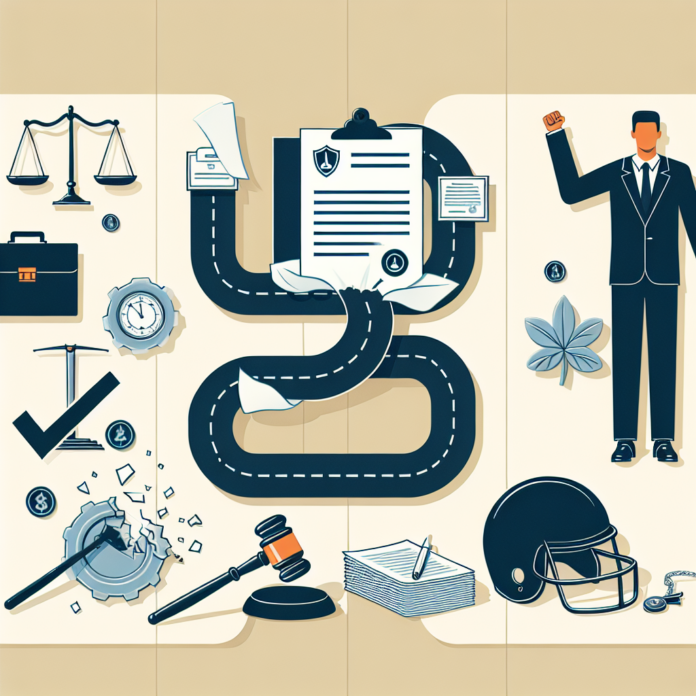Family Legal Matters: Understanding Your Options in Custody and Support Cases
Navigating family legal matters can feel overwhelming, especially when it comes to custody and support cases. Whether you're facing a divorce or seeking to establish a co-parenting agreement, understanding your options is crucial for securing the best outcome for you and your children. In this post, we’ll break down the different types of custody arrangements, the nuances of child support, and the key factors that influence custody decisions—arming you with the knowledge you need to make informed choices during this challenging time.
Types of Custody Arrangements
When navigating family legal matters, understanding the nuances of custody arrangements is essential. Custody is not a one-size-fits-all situation; it can be divided into various types that significantly impact both parents and children.
Legal custody vs. physical custody
Legal custody refers to the right to make significant decisions about a child's life, including education, healthcare, and religious upbringing. In contrast, physical custody pertains to where the child lives and who provides daily care. These distinctions are crucial because they shape the responsibilities and rights of each parent.
For example, a parent with sole legal custody has full authority to make decisions regarding their child’s education without needing approval from the other parent. However, if physical custody is shared, both parents may need to coordinate on living arrangements despite differing authority over decision-making.
Sole custody vs. joint custody
Sole custody grants one parent exclusive rights to make decisions regarding the child’s welfare, while joint custody allows both parents to share these responsibilities. Parents often assume that joint custody leads to equal involvement in a child's life; however, this isn’t always the case.
In practice, one parent may have more influence over day-to-day choices even in a joint arrangement. This can lead to conflicts if both parents have different parenting styles or priorities.
Factors influencing custody decisions
The court's primary consideration in determining custody arrangements is the best interests of the child. Factors such as parental fitness, emotional bonds between parent and child, and stability of living conditions play significant roles in these decisions.
Misunderstandings about what constitutes best interests can lead to unrealistic expectations during court proceedings.
Many courts also consider children's preferences as they mature; however, this varies widely by jurisdiction.
A common misconception is that simply being the primary caregiver automatically results in favorable outcomes during custody evaluations. While caregiving history is essential, courts equally weigh other factors like employment stability and willingness to foster relationships with the other parent.
Understanding Legal Custody
Legal custody is a critical aspect of family legal matters, as it encompasses the authority to make significant decisions regarding a child's upbringing. This includes choices related to education, healthcare, and religious practices. Understanding how legal custody operates is essential for parents navigating custody agreements and ensuring their rights are protected.
Definition and implications of legal custody
When legal custody is awarded to one or both parents, it directly impacts their involvement in a child's life. Sole legal custody grants one parent the exclusive right to make decisions without needing input from the other parent. In contrast, joint legal custody requires both parents to collaborate on major choices affecting the child. The implications can be significant; for instance, a parent with sole legal custody can decide on educational paths without needing consent from the other parent.
Decision-making authority for major life decisions
The authority granted by legal custody shapes how parents navigate essential decisions. For example, if one parent has sole legal custody, they can unilaterally choose a child’s school or medical treatments. This autonomy can lead to friction if the other parent feels excluded from these important discussions.
It's crucial for parents to communicate effectively about major decisions to minimize conflict.
Examples of legal custody arrangements
In practice, legal custody arrangements can vary widely. A common scenario involves joint legal custody where both parents are actively involved in decision-making even if one parent has primary physical custody. This arrangement fosters collaboration but can also lead to disagreements if both parents have different approaches or values.
- Sole Legal Custody: One parent makes all decisions.
- Joint Legal Custody: Both parents share decision-making responsibilities.
Legal custody does not determine where the child lives; that falls under physical custody.
Understanding Physical Custody
Physical custody refers to where a child resides and who is responsible for their daily care. This aspect of custody is critical in family legal matters, as it directly affects the child's living situation and can influence their emotional well-being. Understanding how physical custody works can help parents make informed decisions during custody disputes.
Parents often assume that having physical custody means they have more control over their child's life. However, this isn’t always the case. While the custodial parent may have the child living with them most of the time, they must still navigate co-parenting arrangements, especially when it comes to visitation rights for the non-custodial parent.
Living arrangements for children
The specifics of living arrangements can vary widely. In joint physical custody situations, children may spend significant time with both parents, which can foster strong relationships but also require careful scheduling and communication. For instance, a child might split their time equally between two homes or alternate weeks or months with each parent.
- Joint Physical Custody: Child splits time between both parents' homes.
- Sole Physical Custody: Child primarily lives with one parent while the other has visitation rights.
- Split Custody: Siblings live separately with each parent in different arrangements.
The arrangement should prioritize stability and continuity in the child's life.
It's essential for parents to recognize that physical custody doesn't equate to total authority over parenting decisions. For instance, a custodial parent may face challenges if they wish to make significant changes without consulting the other parent—such as relocating or switching schools—especially if joint legal custody is also in place.
Impact on visitation rights
Visitation rights play a vital role in family legal matters concerning physical custody. The non-custodial parent's access to the child will often be defined by a visitation schedule established during custody negotiations or court rulings. These schedules must be adhered to unless both parents agree on modifications.
A common misconception is that visitation rights are only about weekends or holidays; they can include flexible arrangements tailored to fit both parents' schedules.
In practice, disputes over visitation can arise if one parent feels that the agreed-upon schedule isn't working or if there are concerns about the child's welfare during visits. Parents need to communicate openly and consider mediation services when conflicts arise.
Ultimately, understanding physical custody's nuances—including living arrangements and visitation rights—can lead to better outcomes for both parents and children involved in family legal matters.
Factors Influencing Custody Decisions
The court's evaluation of custody cases hinges on various factors that ultimately shape the custody arrangement. Central to this evaluation is the best interests of the child standard, which prioritizes the child's emotional, physical, and psychological well-being over parental preferences.
A common misjudgment is equating being the primary caregiver with a favorable custody outcome. While caregiving history holds weight, courts consider a broader spectrum of factors such as parental fitness, stability of living conditions, and the ability to foster healthy relationships between the child and both parents.
Best interests of the child standard
The best interests standard encompasses multiple aspects that courts evaluate when determining custody. These include emotional ties between the child and each parent, each parent's capacity to provide for the child's needs, and any history of domestic violence or substance abuse.
- Emotional bonds: Courts often assess how strong the connection is between each parent and their child.
- Parental involvement: Active engagement in a child's life—attending school events or being involved in extracurricular activities—can influence decisions.
- Stability: A stable home environment significantly impacts custody arrangements.
Misunderstanding what constitutes best interests can lead to unrealistic expectations during court proceedings.
Parental fitness evaluations
Parental fitness refers to a parent's ability to provide a safe and supportive environment for their child. Courts may require evaluations by mental health professionals or social workers if there are concerns about a parent's competency.
For example, if one parent has a history of substance abuse or mental health issues, an evaluation might assess their current stability and capacity to parent effectively. This process can be invasive but provides critical insights into parenting capabilities.
It's important for parents undergoing these evaluations to remain open and honest; any attempts to hide issues can backfire during proceedings.
The role of child preferences
As children mature, their preferences regarding custody arrangements may be taken into account by the court. While younger children may not have their voices considered as heavily, older children often have more influence in decisions about where they want to live.
For instance, a teenager expressing a desire to live primarily with one parent due to better communication or shared interests can sway a judge's decision. However, this isn't an automatic guarantee; judges will evaluate whether those preferences align with what they deem is in the child's best interest.
Many courts consider children's preferences as they mature; however, this varies widely by jurisdiction.
Ultimately, understanding these influencing factors—especially how they intertwine with each other—can help parents navigate their expectations and strategies during custody disputes.
Child Support Basics
Child support is a crucial component of family legal matters, aimed at ensuring that children receive adequate financial support from both parents. It is not merely a financial obligation; it reflects the responsibility of parents to provide for their child's needs, including food, clothing, healthcare, and education.
Definition and purpose of child support
The primary purpose of child support is to maintain the child's standard of living post-separation or divorce. Courts establish child support to prevent economic hardship for the custodial parent and ensure that children enjoy similar resources as they would if the family remained intact.
How child support amounts are determined
In determining child support amounts, courts often use specific formulas that consider both parents' incomes and the number of children involved. For example, in many states, a percentage-of-income model applies where a percentage of the non-custodial parent's income will be allocated for child support. This method is straightforward but can lead to disputes regarding what constitutes income and whether additional expenses should be factored in.
Important considerations include variations in state laws and potential adjustments for healthcare or educational expenses.
Variations by state
Child support guidelines vary significantly by state, which can create confusion for parents navigating these waters. Some states have strict formulas, while others allow more leeway based on individual circumstances or negotiations between parents. For instance, California utilizes an income shares model that considers both parents earnings and the time spent with each child. Meanwhile, in New York, guidelines provide a set percentage based on combined parental income but also allow for deviations if circumstances warrant it.'
'It's essential for parents to understand not just their obligations but also their rights when it comes to modifications or enforcement of these payments. Misunderstandings about what can be included—such as medical expenses or extracurricular activities—often lead to complications down the line.'
Research shows that approximately 75% of custodial parents receive some form of child support; however, enforcement remains a significant issue.
Calculating Child Support Payments
Understanding how child support payments are calculated is crucial for parents involved in family legal matters. The methodologies used can significantly affect the financial obligations of the non-custodial parent and the resources available to the custodial parent.
Income shares model vs. percentage-of-income model
Two primary models dominate child support calculations: the income shares model and the percentage-of-income model. The income shares model considers both parents' incomes and aims to maintain a child's standard of living as if the parents were still together. In contrast, the percentage-of-income model allocates a specific percentage of the non-custodial parent's income for child support, which can be simpler but less comprehensive.
The choice between these models can impact overall financial outcomes for both parents.
For instance, in states using an income shares model, if Parent A earns $60,000 and Parent B earns $40,000, their combined income influences how much each contributes to child support. This approach often results in more equitable distributions that reflect actual living conditions.
Adjustments for healthcare and educational expenses
Child support calculations are not static; they often require adjustments for additional expenses such as healthcare and education. Courts may include costs like medical insurance premiums or necessary educational expenditures when determining final amounts.
- Medical expenses: Costs related to health insurance or out-of-pocket medical bills.
- Educational fees: Expenses for tuition, school supplies, or extracurricular activities.
(Note: Parents should keep detailed records of these expenses to avoid disputes later.)
(Example: If a child requires special educational services costing $500 per month, this expense may be factored into the child support calculation.)
Examples from different states guidelines
State guidelines vary widely regarding child support calculations. For example, Florida uses a formula based on both parents' incomes while also considering overnight stays with each parent. This can lead to different obligations depending on parenting time arrangements.
| State |
Calculation Method |
Considerations |
| California |
Income Shares Model |
Both parents' earnings and time spent with children |
| New York |
Percentage-of-Income Model |
Set percentages based on combined parental income |
Parents should familiarize themselves with their state's specific guidelines as they can significantly affect their financial responsibilities.
Modifying Child Support Agreements
Modifying child support agreements is often necessary as circumstances change over time. Parents may experience shifts in income, employment status, or child-related expenses that justify revisiting the original terms of support.
Common situations that warrant modifications include job loss, significant salary increases, or changes in a child's needs such as healthcare or educational expenses. For instance, if a child requires special medical treatment that wasn't anticipated during the initial agreement, this can be a valid reason for seeking an adjustment.
Circumstances that warrant modifications
Changes in financial circumstances are often at the forefront of modification requests. A parent who has lost their job may find it impossible to meet their current support obligations and should seek to modify the agreement accordingly. Conversely, if a parent receives a significant raise, they may be expected to contribute more towards support.
Additionally, changes in the child's living situation or needs can prompt modifications. For example, if a child moves in with the non-custodial parent for an extended period due to a family situation or other reasons, this may necessitate adjustments to the financial responsibilities outlined in the original agreement.
Process for requesting changes in support obligations
To initiate a modification request, parents typically need to file documents with family court outlining their reasons for seeking changes. This process may involve providing evidence of changed circumstances such as income statements or proof of increased expenses related to the child's care.
(Example: If Parent A can show that their income has decreased significantly due to job loss and provide documentation such as termination letters and pay stubs from previous employment, this strengthens their case for reducing support payments.)
(Important: Courts generally require substantial proof of change; mere dissatisfaction with payments is insufficient.)
Importance of documentation in modification requests
Documentation plays a crucial role when modifying child support agreements. Courts rely heavily on factual evidence presented by both parties during modification hearings. This includes financial records like tax returns and pay stubs as well as any relevant medical bills or educational costs.
A lack of proper documentation can derail an otherwise valid request for modification. For instance, if Parent B argues for an increase but fails to provide evidence of rising costs related to childcare or education expenses, they risk having their request denied.
Key takeaway: Always maintain thorough records related to income and child-related expenses; this can make or break your case when seeking modifications.
Ultimately, understanding how modifications work within child support agreements empowers parents to navigate changing circumstances effectively. Being proactive about adjustments not only reflects responsible parenting but also helps ensure that financial obligations align with current realities.
Enforcement of Child Support Orders
Enforcing child support orders is a critical aspect of family legal matters that often goes overlooked until a payment issue arises. Once a court establishes a child support order, both parents are legally obligated to adhere to its terms. However, non-compliance is all too common, which can lead to significant financial strain for the custodial parent and the child.
Methods for enforcing payments
Various methods exist for enforcing child support payments, primarily through state agencies and family courts. The most common approach is wage garnishment, where the non-custodial parent's employer automatically deducts the support amount from their paycheck. Additionally, states may suspend licenses—including driver's and professional licenses—or intercept tax refunds to recover missed payments.
- Wage garnishment: Automatic deduction from paychecks.
- License suspension: Driver's or professional licenses may be revoked.
- Tax refund interception: State can seize tax refunds to cover owed support.
Proactive enforcement measures can significantly improve compliance rates.
Consequences for non-compliance
The consequences of failing to comply with child support orders can be severe and multifaceted. Non-compliant parents may face legal repercussions such as contempt of court charges, which could result in fines or even jail time. Moreover, their credit rating may suffer due to outstanding obligations, affecting future financial opportunities.
(Example: A non-custodial parent who consistently fails to make payments may find themselves unable to secure loans or mortgages due to poor credit history stemming from unpaid child support.)
(Important: Courts take non-compliance seriously; proactive legal advice is crucial.)
Role of state agencies in enforcement
. State agencies play a vital role in monitoring and enforcing child support orders. The Office of Child Support Enforcement (OCSE) in each state oversees these responsibilities, ensuring that both parents fulfill their financial obligations. They maintain databases that track payment history and can initiate enforcement actions when necessary.
However, reliance on state agencies can have its drawbacks. Delays in enforcement actions are common due to bureaucratic processes, leaving custodial parents vulnerable during those periods. Understanding how these agencies operate can help parents navigate potential pitfalls effectively.
Navigating the complexities of state agency involvement often requires legal representation for optimal outcomes.
Navigating Mediation and Court Processes
Mediation is often the preferred first step in family legal matters, particularly in custody and support cases. It allows parents to negotiate terms collaboratively, which can lead to more amicable solutions than court proceedings. Unlike a judge, mediators facilitate discussions rather than make binding decisions, empowering parents to create tailored agreements that reflect their unique family dynamics.
One significant benefit of mediation is the potential for reduced stress and cost. Court battles can be lengthy and expensive, with attorney fees accumulating quickly. Many families find that mediation not only saves money but also minimizes emotional turmoil for everyone involved, especially children who often bear the brunt of parental conflict.
Mediation can lead to more personalized agreements that better serve your family's needs.
However, mediation isn't always a panacea. It requires both parties to engage in good faith negotiations, which isn't always possible in contentious situations. If one parent is uncooperative or if there are issues like domestic violence, mediation may not be appropriate. For instance, if one parent feels threatened or manipulated during discussions, they may need to pursue court intervention instead.
Court Procedures for Custody Hearings
When mediation fails or isn’t feasible, understanding court procedures becomes crucial. Custody hearings typically follow a structured process: filing a petition, gathering evidence, presenting your case before a judge, and awaiting the ruling. Each step requires careful preparation; failing to adhere to procedural requirements can jeopardize your case.
- File necessary documents with the family court.
- Prepare evidence such as witness statements or expert evaluations.
- Present your case clearly and concisely during the hearing.
'In practice, parents often underestimate the importance of documentation. For instance, having detailed records of parenting time or communications related to child welfare can significantly bolster your position in court. Judges appreciate evidence that demonstrates commitment to co-parenting and the child's best interests.'
Tips for Presenting Your Case Effectively
Effective presentation of your case hinges on clarity and organization. Start by articulating your goals clearly—whether it’s seeking custody arrangements or modifications to support payments—so that the judge understands your priorities from the outset.
Be honest about your situation; exaggerating claims can backfire.
Additionally, practicing how you present information can help minimize nerves during hearings. Mock sessions with a family attorney can provide valuable feedback on how well you communicate your points and address potential counterarguments effectively.
A realistic approach includes understanding that judges are looking for evidence of parental responsibility rather than emotional appeals alone. For example, sharing specific examples of involvement in your child's education or extracurricular activities can illustrate commitment more effectively than vague assertions about love or care.
Preparation is key: familiarize yourself with local court rules and consider consulting a family attorney for guidance on navigating hearings.









